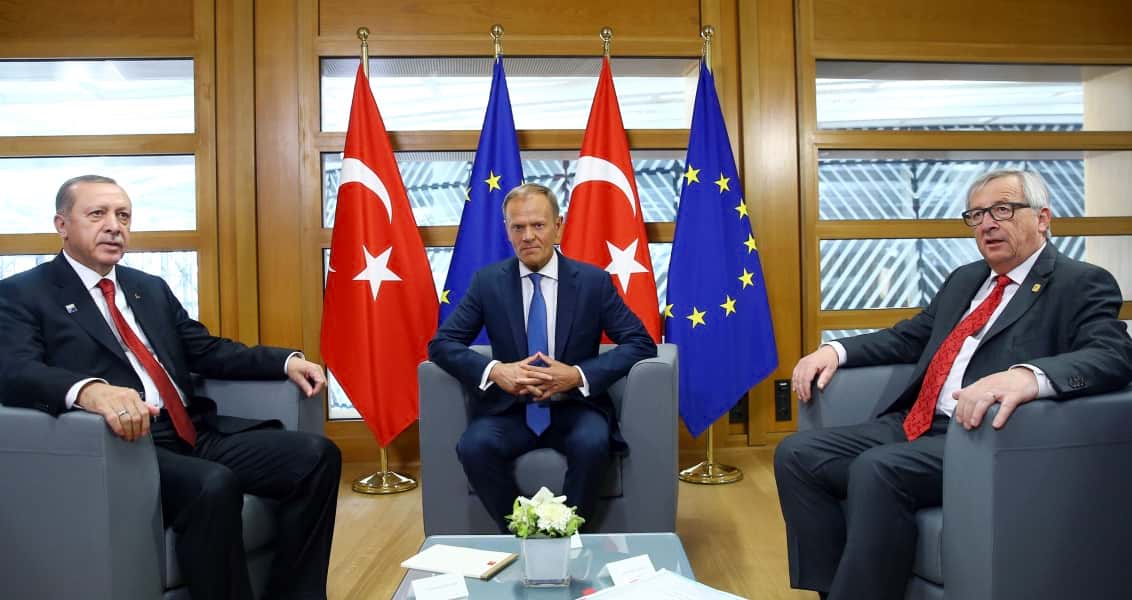
Europe Has a Problem with Erdoğan
Erdoğan keeps a tab on the EU's unfulfilled promises and talks about Europe's unreliability in the public. That's why, the image of him the EU leaders have is he is as an authoritarian Turk
Share
German politicians are against President Recep Tayyip Erdoğan's plans to meet Turkish citizens during the G20 Summit in Hamburg this week. German Foreign Minister Sigmar Gabriel announced that Turkey's request was turned down due to security concerns and the political climate in Germany. This isn't new: In July 2016, the German authorities prevented the Turkish leader from addressing participants in a pro-democracy rally in Cologne. Having no problem with PKK-PYD commanders delivering speeches within their borders and providing a safe haven to coup plotters and FETÖ operatives, Germany's position is hardly compatible with the fact that Turkey is a NATO ally and EU candidate country.
To be clear, the Turkish people have known for some time that the strong and interventionist government of Germany likes to pay lip service to democracy and freedom of expression for the sake of its national interests. German leaders don't just have the September 2017 elections in mind either. European media and politicians have a much bigger problem: They don't know how to deal with President Erdoğan, who has proven time and again that he can mobilize his people at will.
Especially since last summer's coup attempt, the political future of Erdoğan and Turkey's survival and welfare are considered one and the same by millions of Turks. It is no secret that European leaders dream of a Turkey where Erdoğan no longer dominates national politics. The fact that certain European governments, under instructions from Germany, openly supported the "no" campaign ahead of the April 16 constitutional referendum is a case in point. Unfortunately for them, Erdoğan has been winning the popular vote despite the various challenges and assaults. In their view, Erdoğan should have been discredited and removed from power as a result of the Gezi Park revolts, the judicial coup of December 2013 or the July 15 coup attempt. It took much less, after all, to impeach the president of Brazil.
As Turkey withstands attacks and takes steps to address security threats emanating from Syria and Iraq, Erdoğan's public image became a battleground. In recent years, Western media carefully promoted the idea that the Turkish president was an authoritarian Islamist. Whenever the Turkish government makes bold moves in foreign policy, the people who are unhappy with it come up with a new negative description of Erdoğan to target Turkey. Although the narrative pushed by Western media has nothing to do with the facts on the ground, the negative descriptions are reproduced to attack Turks in the future. After the jet crisis, the Russian media had uncontrollably spread anti-Erdoğan news. Nowadays, Turkey's objections to the Qatar blockade cause Erdoğan to be charged with sectarianism by Gulf media. Never mind that the Turkish president was one of the first people in the Middle East to warn about the threat of sectarianism, openly criticize Iranian expansionism and rejected Sunni-Shiite polarization.
Going back to Europe's problem with Erdoğan, though, there are two reasons why European leaders can't figure out a way to deal with the Turkish president. First, Erdoğan is fully committed to looking out for Turkey's vital national security interests and, by extension, openly criticizes the European Union, which they admittedly do not enjoy. In other words, EU leaders are frustrated with Erdoğan because he keeps a tab on their unfulfilled promises and talks about Europe's unreliability in public. Nor are the Europeans happy with Erdoğan's point that Turkey isn't a country that they can easily manipulate. Hence, Erdoğan is labeled an unpredictable, authoritarian Turk, which isn't just orientalist but ultimately indicative of Europe's displeasure. The second problem for Europe's leaders, by extension, is that they have no choice but to cooperate with Erdoğan even though they can no longer manage the EU's relations with Turkey. Ironically, the image of Erdoğan as the boogeyman comes back to haunt European politicians in their own countries.
The only way out for European leaders is to accept that Erdoğan speaks for all of Turkey.
[Daily Sabah, July 3, 2017]
Tags »
Related Articles








